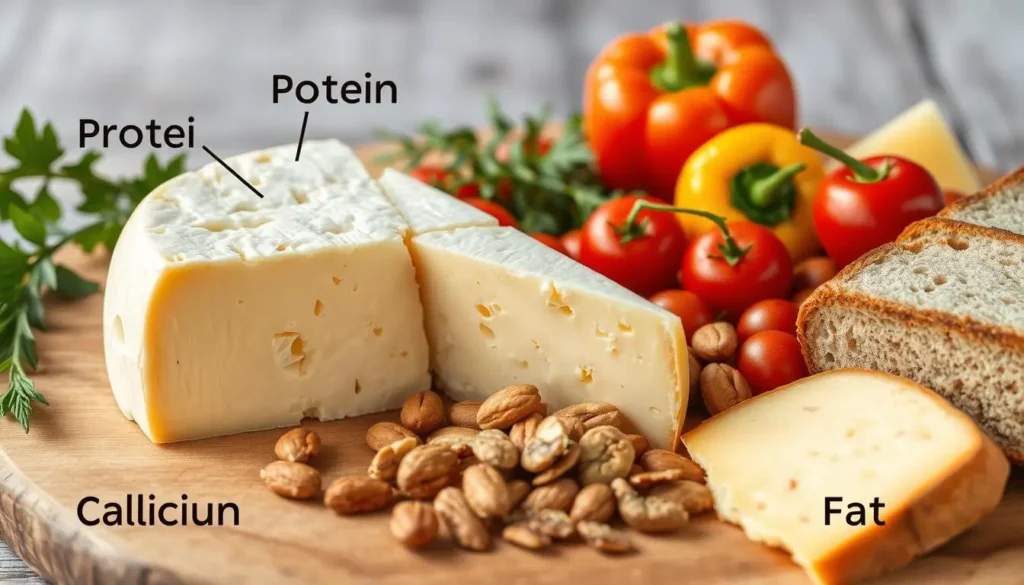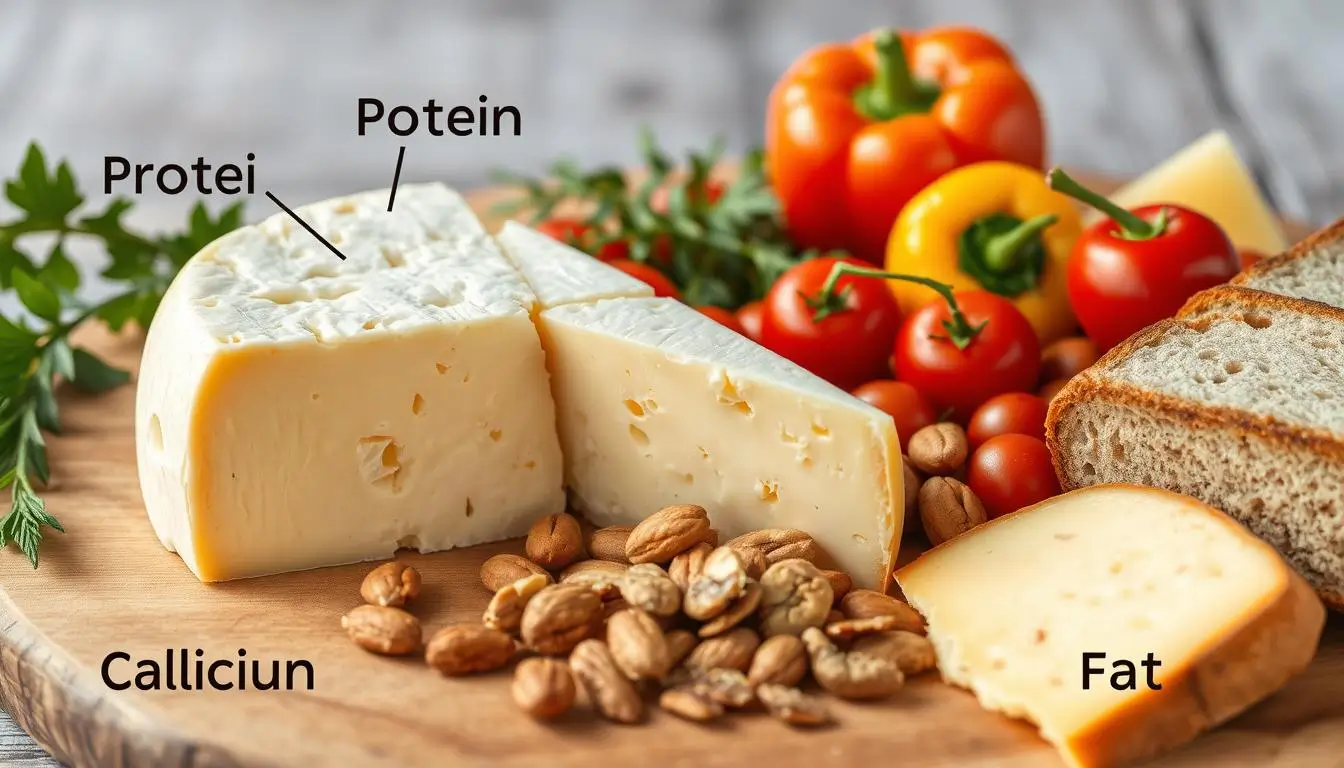Gruyere cheese is loved for its creamy taste and smooth texture. It’s a great choice for many dishes. But is it a healthy option? We’ll look into its nutrition and health benefits to help you decide.
Gruyere cheese is known for its rich flavor and is considered a premium product. But is it good for our diets? We’ll dive into its nutritional profile and compare it to other cheeses.

We’ll examine Gruyere cheese’s benefits and drawbacks. We’ll also compare it to other cheeses. By the end, you’ll know if Gruyere cheese is right for you.
Introduction to Gruyere Cheese
Gruyere cheese is packed with nutrients like protein, calcium, and vitamins. Its taste and texture make it a favorite among cheese fans. We’ll discuss its nutrition and health benefits, including its impact on regular consumption.
Key Takeaways
- Gruyere cheese is a nutrient-rich food with a unique flavor profile
- It’s a good source of protein, calcium, and various vitamins
- Gruyere cheese nutrition is an important consideration for healthy eating
- Healthy cheese options like Gruyere can be part of a balanced diet
- We’ll explore the potential health benefits and drawbacks of Gruyere cheese
- Gruyere cheese is compared to other cheese varieties in terms of nutrition and health impact
Table of Contents
What Makes Gruyere Cheese Unique
Gruyere cheese is a Swiss delicacy known for its rich, creamy flavor. It also has many health benefits. The way it’s made is key to its taste and nutritional value.
The traditional process heats the cheese curd, giving Gruyere its unique flavor and texture. This sets it apart from other cheeses. Gruyere is high in protein, making it great for those who want more protein in their diet.
Origin and Production Methods
Gruyere cheese comes from the Swiss countryside, where it’s been made for centuries. Today, traditional methods are still used, with some modern tweaks. These methods help keep the cheese’s natural flavor and nutrients, making it a good choice for health benefits.
Traditional vs Modern Manufacturing
While traditional methods are still used, some modern changes have been made. These changes can impact the cheese’s nutritional value. It’s important to pick a high-quality Gruyere that balances old and new methods for the best health benefits.

Distinctive Flavor Profile
Gruyere’s unique flavor comes from its traditional production and high-quality ingredients. This flavor makes it a favorite among cheese lovers. Its health benefits also make it a great addition to a balanced diet. With its rich taste and health perks, Gruyere is a beloved cheese worldwide.
Nutritional Profile of Gruyere Cheese
Gruyere cheese is packed with nutrients. It’s a great source of vitamins and minerals. It’s also rich in protein, calcium, and phosphorus.
But, it’s important to remember that Gruyere cheese is high in calories and saturated fat. This might be a problem for those trying to lose weight or dealing with health issues. Still, eating it in small amounts can be good for your diet.
Some key nutrients in Gruyere cheese are:
- Protein: essential for muscle development and maintenance
- Calcium: crucial for bone health
- Phosphorus: important for various bodily functions, including nerve function and metabolism

Knowing the nutritional value of Gruyere cheese helps you make smart diet choices. By understanding the Gruyere cheese nutrition facts, you can enjoy it while staying healthy.
Essential Nutrients in Gruyere
Gruyere cheese is packed with nutrients, making it a great choice for a healthy diet. It’s high in protein, which is key for muscle growth and repair. This makes it perfect for those seeking cheese that’s good for their health.
Some of the key nutrients found in Gruyere cheese include:
- Protein: essential for muscle growth and repair
- Calcium: crucial for maintaining strong bones and teeth
- Vitamins: including vitamin A, vitamin B12, and vitamin D, which are important for overall health and well-being
Gruyere cheese is a top pick for those wanting healthy cheese options. It’s rich in nutrients, offering benefits for overall health and well-being.
Adding Gruyere cheese to your diet can boost your health in many ways. It supports muscle development and keeps bones strong. As a nutrient-rich food, it’s a great choice for a healthy and tasty meal.
Is Gruyere Cheese Healthy for Regular Consumption?
Gruyere cheese is packed with nutrients and offers health benefits when eaten in moderation. It’s a great choice for a balanced diet, providing protein, calcium, and vitamins. But, its high calorie and saturated fat content is something to watch out for.
The cheese is rich in protein, which is good for muscles. It also has calcium, helping keep bones strong. Plus, it’s a good source of vitamins A, B12, and D.
To make Gruyere cheese part of a healthy diet, follow these tips:
- Eat it in moderation, as part of a balanced meal or snack.
- Pair it with fruits, vegetables, or whole grains to balance out calories and fat.
- Opt for low-fat or reduced-sodium options to reduce negative health effects.
In summary, Gruyere cheese can be a healthy choice when eaten in moderation. By knowing its nutritional value and following these tips, you can enjoy its benefits while avoiding its downsides.
Health Benefits of Gruyere Cheese
Gruyere cheese is packed with nutrients that can boost your health. It’s high in protein and calcium, making it a great choice for your diet.
Here are some key benefits of eating Gruyere cheese:
- It helps build and repair muscles thanks to its protein.
- Its calcium content strengthens teeth and bones, improving dental health.
- Vitamins and minerals like vitamin D and zinc boost your immune system.
Muscle Development and Maintenance
The protein in Gruyere cheese is perfect for those who want to build muscle. It helps repair and grow muscles, supporting your fitness goals.
Dental Health Advantages
The calcium in Gruyere cheese is great for your teeth and bones. It can help prevent dental problems and keep your mouth healthy.
Impact on Immune System
Gruyere cheese also supports your immune system. Its vitamins and minerals, like vitamin D and zinc, help keep you healthy and strong.
Potential Drawbacks and Considerations
Gruyere cheese is a healthy cheese option, but it has some downsides. It’s high in calories and saturated fat. This can be a problem for those trying to lose weight or dealing with health issues.
Some folks might find it hard to eat Gruyere cheese because of lactose intolerance or dairy allergies. Yet, for those who can handle it, Gruyere cheese benefits include lots of protein, calcium, and vitamins. To enjoy Gruyere cheese without its downsides, consider these tips:
- Eat it in moderation as part of a balanced diet.
- Go for lower-fat or reduced-sodium options when you can.
- Pair it with other foods rich in nutrients to balance out calories and fat.
By keeping these tips in mind, you can still enjoy the healthy cheese options like Gruyere. You’ll get its benefits, like better bone health and muscle growth.
Remember, a balanced diet with whole foods and mindful cheese eating is key. It helps you have a healthy relationship with food and supports your overall well-being.
| Cheese Type | Calorie Content | Saturated Fat Content |
|---|---|---|
| Gruyere | 115 calories per ounce | 9 grams per ounce |
| Other Cheeses | Varies | Varies |
Incorporating Gruyere into a Balanced Diet
To enjoy Gruyere cheese’s benefits, control your portions and eat it with other healthy foods. It’s a great choice for a balanced diet when eaten in moderation.
Knowing the nutritional facts of Gruyere cheese helps you make smart diet choices. Its rich taste and high nutritional value make it a great addition to meals.
Portion Control Guidelines
Controlling your portions is key to adding Gruyere cheese to your diet. Here are some tips:
- Enjoy Gruyere cheese in moderation, about 1-2 ounces per serving.
- Pair it with fruits, vegetables, and whole grains to balance its richness.
- Don’t overeat Gruyere cheese, as it’s high in calories and saturated fat.
Healthy Serving Suggestions
Here are some healthy ways to include Gruyere cheese in your meals:
- Try grilled cheese sandwiches with whole grain bread and a side of fruit or veggies.
- Make Gruyere and vegetable skewers for a quick snack.
- Enjoy Gruyere and whole grain crackers for a satisfying snack.
By following these tips and serving suggestions, you can enjoy Gruyere cheese’s benefits while keeping your diet balanced. Always consider its nutritional value and control your portions for the best health benefits.
| Nutrient | Amount per 1 oz serving |
|---|---|
| Calories | 115 |
| Protein | 8g |
| Calcium | 20% of the Daily Value (DV) |
Comparing Gruyere to Other Cheese Varieties
Gruyere is just one of many cheeses with health benefits. To make good choices, we need to compare it to other cheeses. Cheeses like cheddar, mozzarella, and feta have their own special qualities.
The health benefits of cheese depend on its nutrients. Nutritional comparisons show Gruyere and other cheeses have different values. For example, Gruyere has more protein than mozzarella but less than cheddar. Knowing these differences helps us pick the right cheese for our diet.
Nutritional Differences
- Gruyere: high in protein, calcium, and vitamins
- Cheddar: rich in protein, calcium, and fat
- Mozzarella: lower in calories, but higher in sodium
- Feta: high in sodium, but rich in calcium and protein
Each cheese has its own health benefits. By choosing wisely and watching portion sizes, we can enjoy cheese while keeping our diet balanced.
Health Impact Differences
The health effects of cheese vary by type and amount. Some cheeses have more calories or sodium, but others offer more health benefits. A diet with a variety of cheeses can improve our health and well-being.
| Cheese Type | Calories per ounce | Protein content |
|---|---|---|
| Gruyere | 115 | 8g |
| Cheddar | 120 | 6g |
| Mozzarella | 80 | 6g |
| Feta | 75 | 4g |
Conclusion
Gruyere cheese is a versatile and nutritious dairy product. It can be a great addition to a balanced diet. Its distinct flavor, rich texture, and nutrient content make it very beneficial.
It supports muscle development and maintenance. It also promotes strong bones and a healthy immune system. The nutritional value of Gruyere cheese is clear.
However, it’s important to remember its high calorie and saturated fat content. Still, adding Gruyere to a well-rounded meal plan can be tasty and healthy. Pair it with fresh produce, whole grains, and lean proteins.
This way, you can enjoy its unique taste and Gruyere cheese benefits while keeping your diet balanced and healthy.
FAQ
Is Gruyere Cheese a Healthy Cheese Option?
Gruyere cheese is packed with nutrients and can be part of a healthy diet. It’s rich in protein, calcium, and vitamins. Just remember to eat it in moderation.
What Makes Gruyere Cheese Unique?
Gruyere cheese comes from Switzerland and is made in a special way. The cheese curd is heated to create its unique taste and texture. Modern methods might change its nutritional value.
What is the Nutritional Profile of Gruyere Cheese?
Gruyere cheese is high in calories and saturated fat. This can be a problem for those watching their weight or dealing with health issues. But, it also has lots of protein, calcium, and vitamins.
What Essential Nutrients are Found in Gruyere Cheese?
Gruyere cheese is full of protein, which helps muscles. It’s also rich in calcium for strong bones and teeth. Plus, it has vitamins A, B12, and D.
Is Gruyere Cheese Healthy for Regular Consumption?
Gruyere cheese is nutritious but high in calories and fat. Eating it in small amounts can make it a healthy part of your diet.
What are the Health Benefits of Gruyere Cheese?
Gruyere cheese supports muscle health and dental health. It also boosts the immune system with its nutrients.
What are the Potential Drawbacks and Considerations of Gruyere Cheese?
Gruyere cheese’s high fat and calorie content is a concern. It’s also a problem for those with lactose intolerance or dairy allergies.
How Can Gruyere Cheese be Incorporated into a Balanced Diet?
To add Gruyere cheese to your diet, control your portions. Pair it with fruits, veggies, and whole grains.
How Does Gruyere Cheese Compare to Other Cheese Varieties?
Gruyere cheese has a unique nutritional profile. Knowing the differences helps you choose the right cheese for your diet.
Visit our Instagram page

